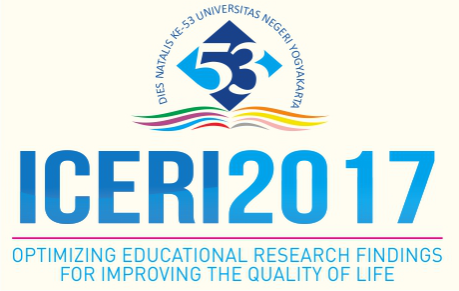
THE 5th
INTERNATIONAL CONFERENCE ON
EDUCATIONAL RESEARCH AND INNOVATION
(ICERI) 2017
MAY 8 - 9, 2017
Universitas Negeri Yogyakarta
Yogyakarta, Indonesia
BACKGROUND
Issues concerning quality of life still become crucial topics in the human life to deal with through comprehensive approaches as the problems of quality of life remain a primary concern in Indonesia and even worldwide. Such problems are very complex for they can result from both stuctural and cultural sources. The structural ones are related to the determinant of the situation and condition of the society’s structure that has not been optimally managed whereas the cultural ones are related to the society’s behaviour of not encouraging the culture to be the power to improve the quality of human life.
The quality of life is a level of satisfaction due to the fulfillment of both the external needs and their perception. Studies on the quality of life from various perspectives remain important issues as they relate to the continuing viability of the society and country. Even the existence of a country is determined by its society’s level of life quality. It is similar to the ranking of population determined by two aspects, namely the objective and subjective ones in the health status. The improvement of Health-related Quality of Life (HQL) covers functional limitations, both the physical and mental ones, as well as the positive expressions of physical, mental, and spiritual prosperity. The quality of life which is understood as the perception of individuals as males or females in life, is seen from the cultural context and the value system where they live, and its relationship to their living standard, hope, enjoyment, and attention, and is combined in a complete way with various aspects, covering the physical as well as psychological health, the level of freedom, the social relationship and their connection with the tranquility of the environment.
The approach to the quality of life can be analyzed from the conceptual and operational aspects so that in the social reality it is related to various theoretical-conceptual differences and perceptual ones in their dimension of measurement. In this case, conceptually the measurement of the quality of life can cover prosperity, quality of continuing viability, individuals’ ability to independently perform daily activities in the cultural context and value system, where they live in relation to their goals, hopes, standards, and what becomes their attention. With the complexity of the problems of life quality which are multidimensional in nature, in terms of being related to the physical, functional, psychological, and social dimensions, studies on such problems are still necessary to conduct in various perspectives.
So far, the research findings produced by universities, research institutes, schools, and practitioners have not been optimally utilized yet to improve the society’s quality of life. They end only with scientific publications and not with dissemination, adoption, and difussion to enable the society to make use of them to improve the quality of life. Therefore, ICERI 2017 will explore how the educational research findings are optimized to improve the quality of life. In this conference, various findings of educational researches and applied researches from academicians, researchers, practitioners, educators, bureaucrats, teachers, and students will be discussed. This forum will contribute various innovative thoughts and proactive strategies for the systemic and sustainable improvement of the quality of lfe.
PARTICIPANTS
This conference is relevant for academicians, researchers, practitioners, educators, bureaucrats, teachers, university students, academic institutions, professional educational associations, and other non-government organizations whose concern is about education.
SUBTHEMES :
- Education and its innovation to improve the quality of life
- Development in science and technology to improve the quality of life
- Sport, food, and health to improve the quality of life
- Empowerment of people’s economy and industries to improve the quality of life
- Utilization of educational, social, cultural, and art assets to improve the quality of life
- Implementation of the religiousity values to improve the quality of life



